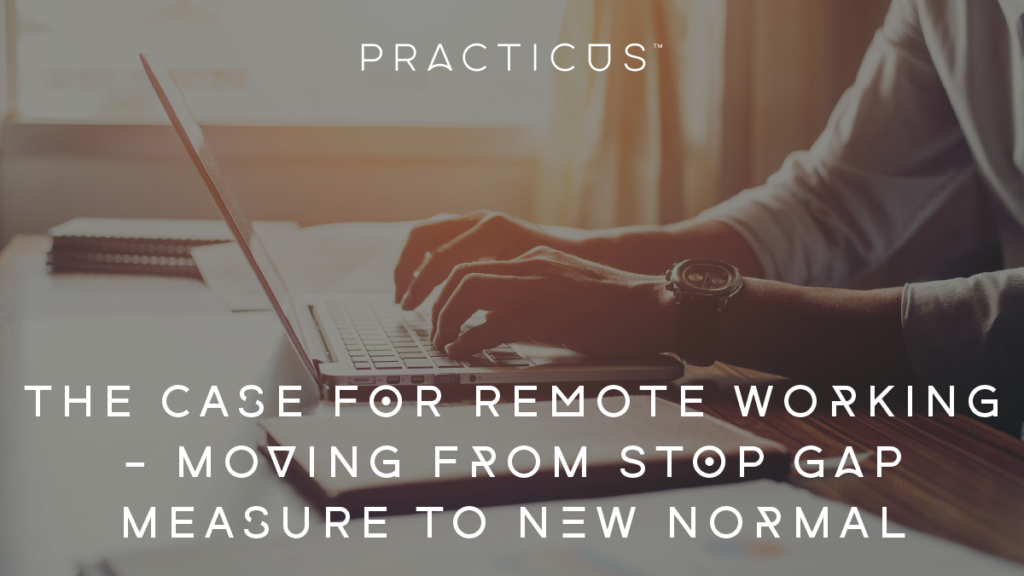The Case for Remote Working in the NHS
From Stop Gap Measure to New Normal

Lisa Lloyd
Health & Social Care Managing Consultant at Practicus
Opportunities
As the pandemic forced people in all manner of professions to work from home for months on end, it became clear that many jobs which had previously been performed on site, can in fact be done remotely. Something employers were reluctant to offer, suddenly became necessity.
It has largely worked. So much so, that today, several companies, have publicly stated they are moving to make certain roles permanently remote and are actively reducing their office space to match. Nationwide, and a host of tech companies are leading the field and responding to employee wishes.
The idea of remote work has been around for a long time, facilitated by technology, but the healthcare sector has been slower to embrace it. Covid-19 changed all that. As things get back to normal, will the prevalence of home working continue, or will old style thinking, and practices return? Now is the time many healthcare leaders are making decisions on how much of the working from home model to retain going forward. For those leaders who have yet to make that decision and even for those who’ve decided already but want to ensure their decision is the right one, this article will cover the benefits and challenges of remote work, as well as key points for long-term success.
For the Hiring Manager there are three distinct advantages to shifting at least some work to remote workers.
- Size of Talent Pool – Hiring only from a ‘within reasonable’ commute area, is inevitably restrictive, especially with today’s IR35 constraints. When you hire someone remotely you can expand your search for qualified talent across the UK.
- Talent Attraction – Remote work options can help attract the best talent for the right job, which in today’s competitive market for certain skills is not easy. By offering remote work, NHS organisations can appeal to top talent who often are only willing to work remotely.
- Knowledge Transfer – Interims with a wealth of work experience gained in other Trusts or NHS settings bring experiential learning and fresh perspectives to new challenges. Their experience can leave lasting skills-transfer legacies and avoid costly mistakes. This important, but more subtle advantage is lost if work policies or tax regulations discourage these experts from working outside their regions. Work policies and practices lie within a Trust’s control, while the negative impact of Government IR35 regulations less so.
A flexible and creative approach to remote working can help to address each of these challenges and deliver three distinct win-wins for both the hiring organisation and the Interim Manager:
Providing healthcare services is a critical part of a nation’s infrastructure and services and just needs to keep running. Furlough or mothballing never an option. The NHS found flexible and innovative ways to do just that across most functional areas including the more complex field of patient consultations and care. The operational challenges faced in all areas were immense and some less critical projects were shelved. Survival became the goal with as much work as possible relocated to home offices.
- Improving workplace safety – safety from infection is an obvious one, but there are other safety mitigations, such as driving while fatigued after long and eventful shifts.
- Capacity constraints – with safe distancing, continuing to be considered important in hospital environments, office space can come at a premium. Employing remote workers alleviates this with only meeting room space required for specific sessions.
- Enhanced efficiency and productivity – research has found that working from home can boost employee productivity, improve work/life balance, and foster better mental health (not to mention reduce pollution from commuting).
Challenges
Remote working provides flexible work arrangements for hired workers but also presents a set of challenges for employers, which can easily be managed with the right technology and the right organisational culture. Some of the main ones are:
- Network Security — To work effectively for an organisation, remote workers need access to systems. For organisations it is more difficult to secure a network and its endpoints when employees are spread throughout multiple locations than it is to secure a work site where everyone is working in one place. Network security has come a long way, even for home working, and is now much more affordable and robust.
- Communications — With employees not gathering in the same physical space, communication that used to happen organically is gone. This means organisations had to put in place communications forms, both formal, such as video-conferencing and more informal ones, such as chat streams. Equally, more structured approaches to communication across teams and the frameworks established to touch base regularly, inform and engage will remain valuable elements to company cultures in the longer term.
- Ensuring Employee Success – This revolves around ensuring remote workers have access to the systems and the people they need to progress their tasks. Just because someone is physically present in the office does not mean they are productive. Even though the remote team is not seen, it is possible to keep track of things like project status updates, timestamps, and communication threads to keep an eye on how things are moving along. In this way, tracking progress with an in-person team is no different than tracking a virtual team. The important thing is setting and managing clear expectations.
Making Remote Working Sustainable
We’ve all come a long way in the past year, forced by circumstances to look at remote working with fresh eyes and driven by experience to understand how to tackle the challenges it involves and embrace the advantages it offers. Many of the positive changes should have an enduring impact.
We recognise that for some remote working is still a work in progress and individual organisations need to understand the full implications for their own operational requirements, leadership and employee preferences to design more permanent policies. It’s a sea change that provides a milestone opportunity for aligning people strategies to operational goals. Forward thinking ones have put in place structures and processes to not only be operational, but to push up productivity levels as well.
As the conversation with the CEO and the CFO at this year’s NHS Confed Conference underscored, to meet productivity targets, ever greater pressure will be brought to bear on Trusts to be both innovative and efficient. NHS organisations must continue to focus on identifying how efficiencies can be driven and services redesigned to achieve the aims of quality, productivity and patient outcome.
The NHS is currently undergoing a period of intensive change – technological, social and economic and there is a real need for a management layer to facilitate this change. Interim managers offer the NHS cost-effective access to high level performers with a track record of quantifiable achievement and this is a truly vital resource for helping to deliver the changes needed.
With proven remote working, there is a real opportunity for NHS organisations to seize the moment and hire the best person in the country for the job – to achieve the transformation and efficiencies they need.
End Note:
It is worth remembering that the NHS usually hires Interim Managers for their specific skillset and experience. These Interims are used to working alone and work with a single focus to achieve timely results for the objectives set. They consistently maintain professional and high standards because their future work relies upon referrals and a successful track record. They therefore have a stake in the success of the assignments they undertake. They would not let remote working compromise this. The importance of highly skilled, commercial managers to navigate the everchanging landscape of the NHS is clear. At Practicus, we can demonstrate how interims materially influence the performance of organisations.

Lisa Lloyd
Health & Social Care Managing Consultant
LinkedIn
Our unrivaled client and candidate support have made us the first choice for healthcare appointments. Get in touch if you wish to find out more.